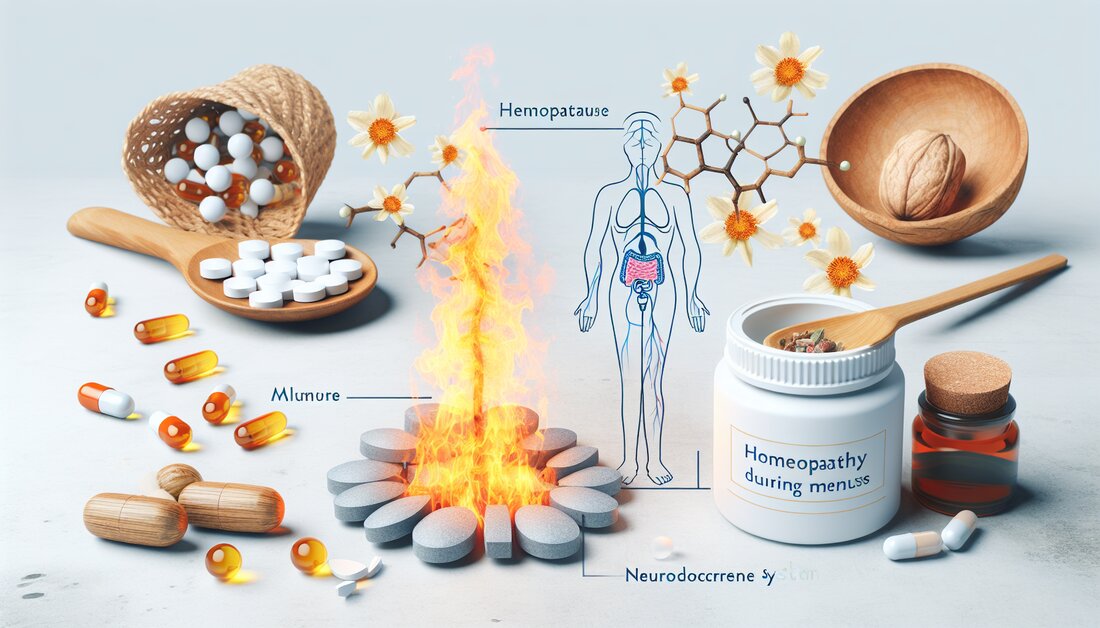Homeopathy for menopause: insights into neuroendocrine effects
Why are homeopathic remedies used for menopause? New insights into neuroendocrine effects! #menopause #homeopathy

Homeopathy for menopause: insights into neuroendocrine effects
Menopause is a natural period of life that marks the end of a woman's childbearing years. It often brings unpleasant symptoms such as hot flashes and mood swings. Many women are looking for gentle treatment methods, including homeopathy. Homeopathic remedies (HMs) have long been used to relieve these conditions, although there is a lack of extensive clinical research in this area. It is not known exactly whether and how these agents work at the neuroendocrine level, i.e. to what extent they can influence hormones and the nervous system to improve menopausal symptoms.
Research has focused on better understanding the changes that occur during menopause, particularly how neuroendocrine changes can influence hot flashes and mood swings. It was investigated whether certain homeopathic remedies that are often prescribed for menopausal symptoms could have an effect on the nervous and endocrine systems. The research showed that changes in gonadal hormones that occur during menopause affect neurotransmitter systems. This plays a role in mood disorders and body temperature regulation. It was discovered that some homeopathic remedies had anti-anxiety effects in rodent models, which may suggest that they could also have a similar effect in humans.
The conclusion of this research suggests that homeopathic remedies may trigger neuroendocrine effects in the body directly or indirectly, possibly about a previously unknown biological mechanism. However, many questions in this area are still unanswered, which means that further pre-clinical and clinical research is necessary to confirm these hypotheses.
These findings could lead to homeopathic remedies being recognized as an effective treatment for menopausal symptoms in the future if their action and effectiveness are supported by further research. This would also mean that doctors and health care providers may reconsider their current practices and increasingly consider homeopathic remedies to support women going through menopause.
Basic terms and concepts:
- Menopause: Die Lebensphase einer Frau, in der sie aufhört, menstruativ zu sein, was das Ende der Fortpflanzungsfähigkeit kennzeichnet.
- Neuroendokrine Wirkung: Einfluss auf das Nerven- und Hormonsystem.
- Homöopathische Mittel (HMs): In der Homöopathie verwendete Substanzen, die darauf abzielen, Heilung durch die Verwendung von stark verdünnten Mitteln zu fördern, von denen angenommen wird, dass sie im Körper ähnliche Symptome wie die zu behandelnde Krankheit hervorrufen.
- Gonadenhormone: Hormone, die von den Geschlechtsdrüsen produziert werden und u.a. die Fortpflanzung und sexuelle Funktion beeinflussen.
- Neurotransmitter: Chemische Botenstoffe im Nervensystem, die Informationen zwischen den Nervenzellen übertragen.
Neuroendocrine effects of homeopathic remedies in menopausal complaints
Investigating the possible neuroendocrine effects of homeopathic remedies (HMs) on menopausal symptoms such as vasomotor symptoms and mood changes is the focus of this research. In particular, the analysis of the mode of action of two commonly prescribed homeopathic remedies for menopausal symptoms illustrates the scientific interest in a more precise understanding of the use of homeopathy while considering the neuroendocrine level.
methodology
For this study, a comprehensive literature review was conducted, focusing on the pathophysiology of menopause, depressive changes, as well as current evidence for the effects of HMs in relation to menopause and depression. The research sheds light on the neuroendocrine changes associated with vasomotor symptoms and mood changes during menopause. Among other things, the role of gonadal hormones and their influence on neurotransmitter systems were examined.
Main results
It was found that neuroendocrine changes play an important role in the pathophysiology of menopausal symptoms. Gonadal hormones that affect neurotransmitter systems are involved in the regulation of the mood and the temperature regulation. The examination of and showed that these substances in animal models can cause anxiolytic effects. In addition, the ink of the common squid (Sepia Officinalis) includes dopamine, a neurotransmitter that plays a role in mood regulation.
Conclusions
The results of this study support the hypothesis that homeopathic remedies that contribute to improving menopausal symptoms in daily practice may cause direct or indirect neuroendocrine effects in the body. These effects could be conveyed through previously unknown biological mechanisms. The research results suggest that further pre-clinical and clinical research are necessary to answer the questions raised and to understand the neuroendocrine mechanisms of action of homeopathic remedies during menopause.
The knowledge presented underpins the importance of well -founded clinical and preclinical research in this area in order to explore the potential neuroendocrine mechanisms of mechanisms of homeopathic remedies to menopausal complaints and to expand the therapeutic applications of these alternative forms of treatment.

 Suche
Suche
 Mein Konto
Mein Konto
